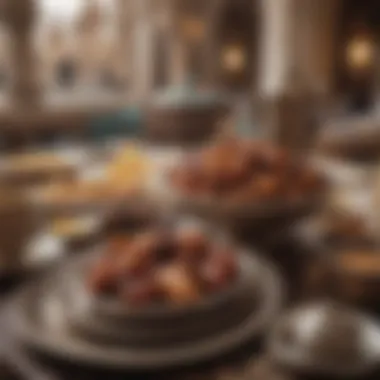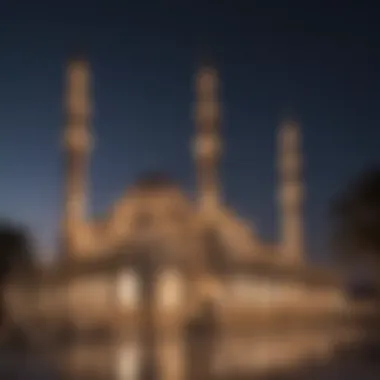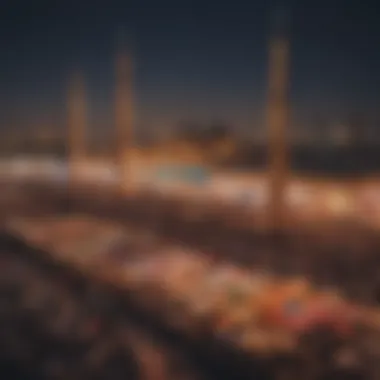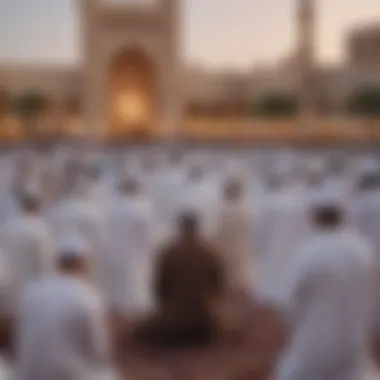Ramadan 2023 in Dubai: Cultural Insights and Events


Intro
Ramadan in Dubai is not just a religious observance; it’s a vibrant tapestry woven into the very fabric of life in the city. For those unacquainted, Ramadan is the ninth month of the Islamic lunar calendar and marks a period of fasting, reflection, and community. However, in Dubai, it transcends mere spiritual practice; it transforms social norms, culinary experiences, and even the real estate market.
In 2023, the holy month is expected to bring unique nuances and shifts, defining how residents and visitors experience this significant time. While the specific dates shift each year due to the lunar calendar, the energy and ambiance of Ramadan remain disappointingly captivating.
This guide will navigate through vital information regarding the observance’s timing and its profound influence on various facets of life in Dubai, notably its lifestyle and real estate dynamics. Furthermore, we’ll delve into market trends, investment opportunities, and how the month’s cultural practices ripple through the city.
As we proceed, expect to uncover not just the dates and practices but the compelling stories behind them. Let’s delve deeper into the market trends that emerge during this ethereal time.
Preamble to Ramadan in Dubai
Understanding Ramadan in Dubai goes beyond just knowing the dates; it encapsulates the profound connection of culture, spirituality, and community engagement. For individuals, businesses, and visitors alike, grasping its significance leads to a deeper appreciation of the local customs and practices that permeate the city during this holy month. The observance of Ramadan affects everyone from residents to tourists, making it an essential topic for discussion in today’s Dubai.
Understanding Ramadan
Ramadan is the ninth month of the Islamic calendar and holds an immense place in the hearts of Muslims. It encourages fasting, prayer, reflection, and community bonds. Observing Ramadan is not merely about abstaining from food and drink; it integrates several aspects of self-discipline and spiritual growth. During this month, Muslims strive for a heightened awareness of faith, engage in charitable acts, and strengthen their connections within the community.
For many, the significance is tied to the teachings of the Qur'an, which Muslims believe was first revealed to the Prophet Muhammad during this month. As such, the act of fasting becomes a way to purify the soul and foster empathy for those less fortunate. In a city like Dubai, marked by an eclectic mix of cultures, understanding this period helps foster mutual respect and cultural sensitivity.
Cultural Significance in the UAE
In the United Arab Emirates, and particularly in Dubai, Ramadan transcends religious observance; it embodies cultural heritage and national identity. The UAE, with its diverse population, implements customs that reflect both traditional Islamic values and modern societal dynamics.
During this holy month, various elements come into play:
- Unity and Community: Iftar meals, breaking the fast at sunset, serve as opportunities for family and friends to gather. Many public places hold large community iftars, fostering a spirit of togetherness.
- Charity and Zakat: The principle of giving during Ramadan is profoundly significant. Many residents contribute to local charities, ensuring that those in need are cared for during this time.
- Festivities and Celebrations: The atmosphere in Dubai changes dramatically with vibrant lights, decorations, and public events. Traditional cultural performances often highlight Emirati heritage, drawing participation from various communities.
Ramadan in Dubai is not just about private observance; it's about inclusivity and shared experiences that transcend individual religious beliefs.
"Understanding Ramadan in Dubai is essential not only for the Muslim community but also for everyone who lives in or visits the city during this transformative time".
In 2023, as Ramadan approaches, being informed about its practices and significance allows investors, buyers, and local businesses to navigate the cultural landscape effectively. Recognizing the moving parts, from timings of business hours to community events, will enable a more enriching engagement with this beautiful part of life in Dubai.
Ramadan Dates in Dubai
The dates of Ramadan are not just mere calendar entries; they bear immense significance for the Muslim community and other residents in Dubai. For many, knowing when Ramadan starts and ends frames their daily routines, prayer schedules, and communal gatherings. The month is a period of spiritual reflection and reinforces the connection to culture and faith. The anticipation of this holy month triggers a flurry of preparations, from special activities to adjusting personal and professional undertakings.
Start Date
For the year 2023, the anticipated start date of Ramadan in Dubai is likely around March 23. This timing hinges on the sighting of the moon, which has been a longstanding method used within the Islamic tradition. A few days before the start, announcements are made through various channels—mosques, media, and social networks—to inform the community.
This initial phase instills a sense of excitement among many families, signifying a time of increased prayer and community involvement. It's essential for people of all backgrounds residing in Dubai to be aware, as changes in local customs and business operations become noticeable.


"Ramadan shapes the social and cultural landscape of Dubai, making it essential to observe the start date closely."
End Date
As Ramadan unfolds, it lasts for 29 to 30 days, and in 2023, it is expected to conclude on April 21 or possibly April 22, pending the lunar calendar's readings. The end of Ramadan is marked by Eid al-Fitr, a festive occasion that brings together friends and family. This day is filled with prayers, joyous gatherings, and, crucially, the giving of Zakat al-Fitr—charitable donations meant to ensure that everyone can partake in the holiday celebrations. The conclusion of Ramadan serves not only as a celebration but also as a reflective moment on the month that just passed.
Key Dates to Remember
The timeline of Ramadan is peppered with key observances that can greatly enhance one's understanding of the monthly rhythm. Here are some important dates to note:
- March 23: Anticipated start of Ramadan 2023
- April 21 or 22: Expected end of Ramadan and Eid al-Fitr celebrations
- April 20: Laylat al-Qadr (the Night of Power), a significant night for prayers and supplications, believed to take place within the last ten days of Ramadan.
Being mindful of these dates is advantageous for residents and visitors alike. Those engaged in business should prepare for alterations in operational hours as many establishments might close early in observance of fasting hours. Additionally, the cultural landscape becomes vibrant with community events, food offerings, and charitable activities, inviting everyone to partake in the celebratory essence of Ramadan.
Establishing a clear understanding of these dates lays a solid groundwork for navigating life in Dubai during this important month.
Experience Ramadan in Dubai
Experiencing Ramadan in Dubai is more than just acknowledging a calendar event; it’s about immersing oneself in a vibrant tapestry of tradition, spirituality, and community emotion. For both residents and visitors, Ramadan is a unique chance to witness the strong threads of faith that weave through the UAE culture. The atmosphere changes dramatically as the sun sets, bringing people together in various settings, from cozy homes to bustling community tents.
Iftar Traditions
Iftar, the meal to break the daily fast, is filled with rich cultural significance. Each evening as the call to prayer (adhan) echoes through the city, families and friends gather to partake in a meal that not only nourishes the body but also feeds the soul. Dates and water make the initial break, symbolizing the tradition of Prophet Muhammad, followed by an array of dishes that reflects diverse culinary backgrounds. In Dubai, you can expect to find everything from traditional Emirati dishes like harees and majboos to international cuisines that span the globe.
Many hotels and restaurants host lavish buffets during Ramadan, creating a festive ambiance. Some popular spots include the Jumeirah Al Naseem and Atlantis The Palm, known for their unique offerings. These locations also cater to the high demand for special iftar experiences, ensuring guests can enjoy the spirit of the month in style. In practice, this is not just about food; it’s about gathering, sharing, and being part of a larger community.
Suhoor and Community Gatherings
Suhoor, the pre-dawn meal before the fast begins, holds its own special meaning. It serves as a reminder of the importance of community during this holy month. Many choose to share this meal with family or friends, adding another layer to the social dynamics prevalent during Ramadan. As the sun rises, the city remains a buzz with activity as people head out for last-minute errands before the day of fasting begins.
Moreover, during this time, mosques open their doors wide, welcoming anyone who wishes to join in the communal iftar celebrations. Community gatherings create bonds that may turn acquaintances into lifelong friends, reinforcing the importance of unity during the holy month. Notably, venues set up for communal iftar are particularly significant in Dubai’s context, marrying generosity with hospitality.
Prayer and Reflection
Prayer is central during Ramadan, acting as a cornerstone of spiritual rejuvenation. Whether one is a practicing Muslim or simply observing the traditions, the opportunity for reflection and introspection is commendable. Many people who work in Dubai often find solace in the beautiful mosques that fill the cityscape, such as the Sobha Group Mosque and the Sheikh Zayed Grand Mosque, where they can connect with their faith in peace.
As the heart of the month unfolds, engaging in daily prayers and special Taraweeh prayers allows individuals to deepen their understanding of their faith. The rhythm of the prayers marks not just time, but a peaceful state of being—a time to pause and reflect on life’s priorities and to cultivate gratitude.
"Ramadan is not just limited to fasting, but encompasses kindness, reflection, and sharing with those around us."
Impact on Daily Life in Dubai
The month of Ramadan holds an immense significance in the daily lives of those in Dubai, affecting various aspects such as social interactions, business operations, and personal health. Understanding these impacts can be vital for residents and visitors alike, especially for those who are invested in the local culture or real estate market. The rhythm of life shifts in noticeable ways, shaping both routines and community activities.
Changes in Business Hours


During Ramadan, many businesses tend to adjust their operating hours to accommodate the fasting regime. Generally, a common pattern is for shops and offices to open later in the morning and close earlier in the evening. For instance, typical working hours might shift from 9 AM to 5 PM, instead transitioning to 10 AM to 4 PM. Restaurants and cafes, on the other hand, often remain closed during daylight hours, reopening to serve Iftar meals once the sun sets. This timing shift not only allows employees who are observing faster to balance their work commitments with their spiritual obligations but it also caters to those who look forward to breaking their fast in the company of friends and family.
"The business landscape transforms during Ramadan, creating a unique dynamic of productivity and community spirit as people come together to share their experiences over meals.”
Social Dynamics During Ramadan
Social interactions undergo a transformation in Ramadan, as community bonding intensifies and people are drawn towards charitable acts. Family gatherings and community Iftar events become common occurrences. It isn't just about sharing a meal; it's also about strengthening ties and fostering a spirit of compassion. People often host Iftar dinners in their homes or at community centers, inviting friends and neighbors regardless of their background. This openness helps build bridges across different cultures within Dubai.
Additionally, the atmosphere around the city changes; streets bustling with activity during the day appear quieter, while nightfall brings life back into bustling markets (souks) and promenades, where people gather to take part in festivities. Observing such cultural practices can even provide potential investors and developers valuable insights into consumer behavior during this sacred time.
Health and Well-being Considerations
Observing Ramadan presents unique challenges and opportunities for health and well-being. Fasting from dawn until sunset requires individuals to be mindful of their diet and hydration levels, especially in the warmer climate of Dubai. Nutrition becomes a focal point, with an emphasis on consuming wholesome foods during Suhoor and Iftar. Many people opt for nutritious options like dates, lentils, and vegetables to ensure their bodies are replenished after a long day of fasting.
Moreover, physical activity patterns might shift, as many choose to exercise during the cooler hours of evening post-Iftar rather than during the day. The observance of fasting also serves as an opportunity for individuals to reflect on their health habits and reassess lifestyle choices. For businesses in the health sector, such as gyms or wellness companies, this period can present opportunities for tailored services and products that cater specifically to Ramadan-focused routines.
Overall, the impact of Ramadan on daily life in Dubai creates a multifaceted environment where traditions intertwine with modernity, offering unique experiences for everyone involved.
Lifestyle Adjustments in the Real Estate Market
Ramadan is not just a time of spiritual reflection in Dubai; it brings noticeable shifts in lifestyles that ripple through various sectors, especially real estate. The month is characterized by various social and cultural facets that influence not only how people live but also how they view and engage with property in the city. Understanding these adjustments is crucial for investors, buyers, and developers who seek to navigate this multifaceted environment effectively. In this section, we'll explore the changes in rental demand, investment opportunities, and market trends which are all interlinked with the observance of Ramadan.
Increased Demand for Rental Properties
As Ramadan approaches, there’s often a marked uptick in the demand for rental properties. Families and individuals alike look for homes that cater to their needs during this holy month. Many seek larger spaces to comfortably host family gatherings for Iftar, the evening meal that breaks the fast, while some prefer units closer to mosques to facilitate easier attendance at Taraweeh prayers.
This surge in demand often leads to higher rental prices, particularly for three- and four-bedroom apartments. Moreover, landlords may find it beneficial to adjust their rental agreements to attract this seasonal influx. Being flexible with short-term leases can appeal to newcomers who are just spending Ramadan in the city. The real estate market becomes an exciting arena, full of opportunities for those who can understand and respond to the ebbs and flows dictated by cultural observances.
Evolving Investment Opportunities
For investors, Ramadan presents both challenges and opportunities. As culture steers lifestyle choices, new trends in property development emerge. There is a noticeable shift toward creating community-focused spaces that facilitate social gatherings. Investors might find promising prospects in developing property that includes community facilities—like gathering spaces or recreational areas. This aligns well not just with Ramadan, but the general lifestyle aspirations within Dubai’s diverse population.
Additionally, properties that provide amenities tailored to Ramadan, such as larger kitchens or nearby prayer facilities, might attract more attention during this period. Being able to offer something unique can set a property apart. Thus, those who think strategically about how to market and develop real estate during Ramadan might see significant returns in their investments.
Short-Term Rentals and Hospitality Trends
Ramadan also influences the short-term rental market significantly. During this month, many expatriates choose to travel back to their home countries, freeing up their rentals. This provides savvy investors a chance to step in and fill the gap, catering specifically to pilgrims or travelers who want to experience Ramadan in this vibrant city.
Hospitality sectors adapt by enhancing their offerings to cater to festive gatherings, both for Iftar and Suhoor. Hotels and serviced apartments often feature special Ramadan packages to attract visitors while offering local experiences that highlight the month’s spirit. For real estate professionals involved in hospitality, embracing this seasonal wave can yield compelling business opportunities, allowing them to work collaboratively with local restaurants and event organizers.
"Understanding the lifestyle changes during Ramadan isn't just essential; it's the backbone of a successful strategy in the real estate market."
Overall, the lifestyle adjustments during Ramadan significantly shape the real estate landscape in Dubai. Adapting practices to align with these seasonal changes can potentially lead to lucrative outcomes for those involved in the market. By paying attention to the patterns of demand, investment potential, and trends in short-term rentals, agents and investors can navigate the intricacies of the evolving market landscape during this profound month.


Celebratory Events and Gatherings
During Ramadan, the essence of community spirit shines brightest through various events and gatherings that take place across Dubai. This focal point of celebration is essential for not just religious observance but for fostering connections among individuals of varied backgrounds. The importance of these events lies in their ability to transcend cultural barriers, allowing both residents and visitors to engage in a shared experience of compassion and camaraderie.
Cultural Festivities During Ramadan
Cultural festivities during Ramadan reflect the rich tapestry of life in Dubai. From vibrant night markets to traditional performances, the city seems to pulse with life after sunset. Here, families congregate to enjoy special meals, showcasing a medley of culinary delights that speak to the diverse populations residing in the UAE.
Local parks often host open-air concerts, which feature everything from classical music to contemporary art shows. Dates are especially popular, symbolizing hospitality, and they are a must-try for anyone indulging in the spirit of the season. Notably, the Dubai Food Festival, which usually aligns with Ramadan, enhances the dining experiences with themed nights, where participating restaurants offer iftar buffets at discounted prices. This not only broadens options for breaking the fast but also boosts local businesses.
Charitable Initiatives
Ramadan inspires a strong sense of giving, prompting numerous charitable initiatives that encapsulate the core values of the month. In Dubai, organizations are not just focused on their own endeavors; they rally communities together to support those in need.
- Non-profit organizations work tirelessly to distribute food packs to low-income families, ensuring they don't go hungry during iftar.
- Fundraising events often occur, from charity runs to auctions, where proceeds go towards various causes like education or healthcare.
- Many locals participate in Zakat, which is mandatory almsgiving in Islam, to help the less fortunate among them, further promoting the culture of generosity.
"Charity does not diminish wealth; it increases it and blesses it."
Such actions uplift the community and provide an opportunity for everyone to play a part in making a difference, reaffirming that the true spirit of Ramadan goes far beyond fasting.
Community Engagement Opportunities
The month of Ramadan opens up numerous opportunities for community engagement. Developers and planners in Dubai understand the necessity of creating spaces that are not just residential but also communal. You might find that parks host community events where families can break their fast together on a larger scale, transcending individual households.
Schools and community centers organize interactive sessions that educate participants about the significance of the month, often inviting speakers to discuss topics related to spirituality and personal growth. Such gatherings foster respect and understanding between different cultures.
In the real estate sphere, property management companies often organize community iftar gatherings at their residential complexes, which serve to unionize tenants and build a sense of belonging. These are perfect opportunities to deepen relationships and create a culture where neighbors know each other by name.
Closure: The Essence of Ramadan in Dubai
In understanding the true essence of Ramadan in Dubai, one must recognize its intricate weave of spiritual reflection, community bonding, and cultural heritage that permeates the entire city. It transcends being merely a month of fasting; it is a period where faith is thoroughly practiced, and community spirit shines brighter than ever.
The significance of Ramadan stretches beyond individual practice. It creates a shared experience that binds various demographics together under the common thread of respect, compassion, and generosity. For those living in or visiting Dubai, it presents an opportunity to engage in communal rituals that foster unity and understanding among diverse cultures. Dubai's vibrancy during this holy month serves as a powerful reminder of the values of empathy and charities that are often overshadowed in today’s fast-paced world.
"Ramadan teaches us self-discipline and encourages strong community ties, making it a cornerstone of the cultural fabric of Dubai."
Reflections on Community and Faith
The spiritual dimension of Ramadan in Dubai cannot be understated. It is a time when local mosques like the Jumeirah Mosque and the Grand Mosque in Dubai come alive with prayers and gatherings. The evenings resonate with the sound of community as the masses gather for Iftar, breaking their fasts together, a sight that exemplifies unity amidst diversity. This communal Iftar invites Muslims and non-Muslims alike, promoting a spirit of inclusivity.
Such moments serve as a reminder that faith isn't merely a personal affair but a collective experience, enriched further by shared meals and joys among strangers who become friends, or neighbors who become family. This social tapestry, intertwined with acts of charity and kindness, showcases the importance of communal harmony, allowing every individual to contribute positively to society.
Furthermore, Ramadan incites reflection among individuals, provoking thoughts around gratitude and the essence of spirituality. It encourages each person to evaluate their lives against the backdrop of their beliefs, leading to a deeper understanding of self and community. Those fasting in Dubai often describe this experience as spiritually enhancing, connecting them deeper with their family, faith, and surroundings.
Looking Ahead to Future Observances
As we look to the future, Ramadan in Dubai continues to evolve while maintaining its core principles. The essence of the month remains unchanged, yet the way it is experienced often adapts to modern dynamics. For instance, the rise of technology has facilitated virtual gatherings and online charity drives, strengthening connections that might have previously faltered amidst busy lifestyles.
Real estate markets are also seeing shifts in response to Ramadan. With a growing interest in family-oriented properties, optimizing communal spaces for Iftar events is becoming a consideration for developers and investors alike. This is a crucial factor for those in real estate, as incorporating cultural nuances can vastly enhance property appeal.
Ultimately, as Ramadan continues to be observed in Dubai, it offers lessons in community engagement, social responsibility, and spiritual awareness. Future observances are likely to build on these lessons, continuing to strengthen the fabric of this remarkable city. The essence of Ramadan will remain pivotal, binding communities together through shared faith, reflections, and a commitment to bettering the lives of others.



